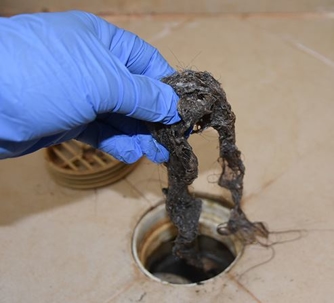If you’re a homeowner, few problems around your home are as annoying as drain clogs are. They happen when you least expect them to, when you need your drain to work the most, and often aren’t quickly resolved.
Even if you do manage to unclog a drain by plunging or using chemical drain cleaners, you know that it’s only a matter of time before it happens again. That’s because these methods don’t really address the underlying reasons for clogs – especially chemical drain cleaners, which can actually cause damage to your pipes!
Read on for more information about six of the most common reasons for drain clogs and how to fix them.
1. Hair, Soap & Dirt
When we take a shower or a bath, a lot of hair, soap scum, and dirt can flow down the drain with our wastewater. In a perfect world, all of this would make it to the sewer, but that’s not the case. Over time, buildup will occur and catch even more hair, soap scum, and dirt as it enters the drain. Eventually, this results in a clog that will require a plumber’s professional snaking or hydrojetting services to clear.
2. Food Waste
If your kitchen sink is clogged, it’s probably because excessive food waste has accumulated in your drain. Although it’s ideal for no food waste to enter your drain – even if you have a garbage disposal – it may be inevitable. Although any kind of food waste can lead to a clog, specific types like coffee grounds, tea leaves, grease, and oil are almost guaranteed to cause a clog. This is because they don’t degrade like other kinds of organic matter and will compact together and become solid over time.
3. Excessive Toilet Paper Use
We all know what to expect when we use a bit too much toilet paper on one flush (for the uninitiated, though, you’re pretty much guaranteed to clog your toilet!). This accident can usually be fixed by plunging, but not all toilet paper that goes down the drain always makes it to the sewer.
Stray bits of toilet paper can cling to the walls of your drain and build up over time. This will cause more frequent clogs over time and can even cause your toilet to overflow, but a plumber can help you inspect and clean your drain to prevent this issue.
4. Mineral Buildup
If you have hard water in your home, your drains are liable to collect mineral buildup over time. This is a very slow and gradual process, but given enough time, flow in drainpipes can be constricted when minerals accumulate along the interior of these pipes. Buildup can also catch things that normally go down a drain and cause them to accumulate.
Mineral buildup can be controlled through regular descaling to remove sediment and excess minerals from hard water. Descaling should be done by a professional plumber to prevent damage to your pipes.
5. Small Objects
Like anything else that goes down the drain, items that definitely don’t belong in them – including sanitary napkins, disinfecting wipes toys, clothing, rocks, and pretty much anything else – can cause clogs. In these cases, homeowners will definitely need a plumber’s help because removing an object from a drain can be a very involved process. Toilets and drain traps may even need to be removed or disassembled to access the items lodged in the pipe to clear the clog.
6. Tree Roots
Believe it or not, but roots from trees, shrubs, and other plant life can cause clogs. Roots seek moisture underground and grown toward wherever it comes from. If small cracks in your drainpipes are leaking even a tiny amount of water, this can attract roots. Once inside your pipes, roots will quickly grow larger and prevent wastewater and sewage from properly draining.
The best way to clear tree roots is through hydrojetting but repairing the drain may be necessary, and that can involve excavation on your property.
